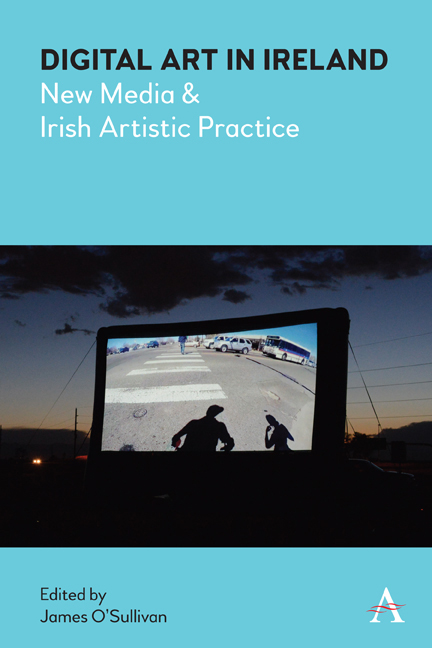Book contents
- Frontmatter
- Dedication
- Contents
- List of Illustrations
- Acknowledgements
- Notes on Contributors
- Chapter 1 Introduction: Digital Art in Ireland
- Chapter 2 Strange Mothers: The Maternal and Contemporary Media Art in Ireland
- Chapter 3 Between Aesthetics and Institutions: Irish Electronic Poetry
- Chapter 4 ‘to shine upon the original all the more fully’: Contemporary New Media Adaptations of James Joyce
- Chapter 5 Art in the Data-City: Critical Data Art in the Age of Surveillance Capitalism
- Chapter 6 Experimental Arcade Video Games as Self-Reflexive Media Art
- Chapter 7 Folding, Unfolding, Refolding Sound Claire Fitch
- Chapter 8 Treacherous Images and Animal Gazes: Ailbhe Ní Bhriain's Reports to an Academy, 2015
- Chapter 9 Pressing Send: Distribution and Curation in Irish New Media Art
- Index
Chapter 3 - Between Aesthetics and Institutions: Irish Electronic Poetry
Published online by Cambridge University Press: 23 February 2022
- Frontmatter
- Dedication
- Contents
- List of Illustrations
- Acknowledgements
- Notes on Contributors
- Chapter 1 Introduction: Digital Art in Ireland
- Chapter 2 Strange Mothers: The Maternal and Contemporary Media Art in Ireland
- Chapter 3 Between Aesthetics and Institutions: Irish Electronic Poetry
- Chapter 4 ‘to shine upon the original all the more fully’: Contemporary New Media Adaptations of James Joyce
- Chapter 5 Art in the Data-City: Critical Data Art in the Age of Surveillance Capitalism
- Chapter 6 Experimental Arcade Video Games as Self-Reflexive Media Art
- Chapter 7 Folding, Unfolding, Refolding Sound Claire Fitch
- Chapter 8 Treacherous Images and Animal Gazes: Ailbhe Ní Bhriain's Reports to an Academy, 2015
- Chapter 9 Pressing Send: Distribution and Curation in Irish New Media Art
- Index
Summary
Experimental Poetry and the Digital Economy in Ireland
During the past few decades, a number of scholars have made observations regarding the relative conservatism and near absence of an avant-garde culture in Irish poetry. Alex Davis, for example, has noted that while the international modernist movement unarguably had its impact on Irish writing, too, the nation's literary culture never quite ended up developing the momentum for “the noisy declamations of the historical avant-garde” (Davis 2000, 81). Similarly, John Goodby has commented on the challenges met by the poets of the Irish neo-avant-garde as they sought to deal with the “[undeniable] conservatism of much Irish poetry […] in a small and congested literary culture based on identitarian cultural politics” (Goodby 2000, 302). Subsequently, however, Goodby has been more careful not to equate the lack of critical attention or public endorsement with a lack of experimental writing as such, and has pointed out that the relative scarcity of critical interest “has unbalanced the understanding of the nature and history of Irish poetry, and left it looking more conservative, coherent, and introspective than it actually is” (Goodby 2012, 607). Indeed, many have also expressed a very different and in some ways contradictory view: that Irish poetry is marked by a considerable degree of diversity. Jerzy Jarniewicz and John McDonagh have highlighted “the disparate, polyvocal and chimerical nature of a good deal of contemporary Irish poetry up to 1990 and beyond” (Jarniewicz and McDonagh 2009, 121). While there is no denying Ireland's contribution to the international modernist avant-garde, for example in the work of Samuel Beckett and James Joyce, both Beckett and Joyce had to make the majority of their “noisy declamations” outside Ireland. Furthermore, polyvocality or cultural diversity does not necessarily lead to radical formal experimentation, or a wider cultural recognition of the communities of experimentation.
The discussions regarding the status of artistic and poetic experimentation assume a renewed relevance in the early twenty-first-century context, as new technologies are rapidly changing our media environment, including the media networks and interfaces through which poetry itself is produced, disseminated and received.
- Type
- Chapter
- Information
- Digital Art in IrelandNew Media and Irish Artistic Practice, pp. 29 - 52Publisher: Anthem PressPrint publication year: 2021



